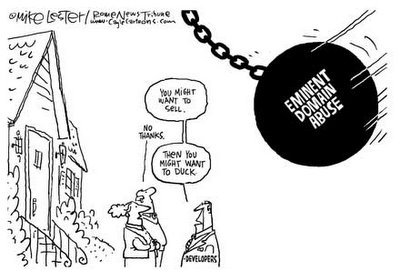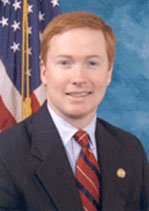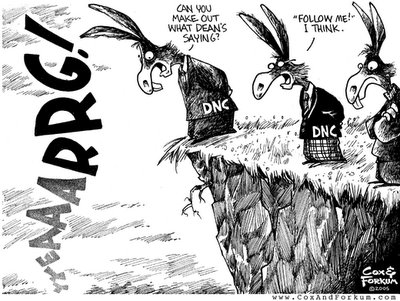Tuesday, November 29, 2005
Stumbaugh To Hold Fundraiser
Beebe Visits Logan County

Attorney General Mike Beebe's gubernatorial campaign got an infusion of funds during two events staged in Logan County last week.Fundraisers held in Paris and Magazine produced contributions in excess of $9,000, according to State Rep. John Paul Wells, D-Paris. Wells hosted a fundraising dinner at his home Tuesday evening, Nov. 8. Earlier in the day, Beebe appeared at a fundraiser held at the MagTel offices in Magazine.The Paris event raised $6,100 and the Magazine event raised $3,650, Wells said. The total was $9,750. There were 75 people, including Beebe, on hand for the Paris event and approximately 50 were at Magazine.The two events were part of 15 staged for Beebe throughout the state one year before the Nov. 8, 2006 general election. Beebe, of Searcy, is seeking the Democratic nomination for Governor.In addition to raising funds, Beebe took an opportunity to talk about issues in the race.Beebe said that while education reform is a priority, it's not the only issue in the race.
“We can't do just one thing,” Beebe said. “Three or four things must be addressed simultaneously.”Those are economic development, health care and criminal justice issues, Beebe said. ...
(Booneville Democrat)
Monday, November 28, 2005
Sheehan Again...
The Pittsburgh Tribune-Review (11/27) reported “If you harbored any lingering doubts as to the motivation of Cindy Sheehan, grieving mom turned Mother Peacenik, harbor no more. Sheehan's latest nerve-scraping -- an Internet-posted open letter to Barbara Bush -- reveals her in all her politically motivated glory…Childlike in her vitriol, she attacks Mrs. Bush for failing to raise a decent human being…‘Did you teach (the president) that killing other people for profits and oil ALWAYS is wrong? Obviously you did not...Casey's beautiful mind was ended by an insurgent's bullet to his brain, but your son might as well have pulled the trigger.’…But read between the lines…This very public saga no longer is about her son. This is no longer about peace. This is Bush-bashing at its worst…But in attempting to discredit President Bush, Sheehan discredits herself. Sheehan has become all about Sheehan, a media machine that would make even Martha Stewart blush. She's now out with a book, ‘Not One More Mother's Child.’ Can ‘Cindy!,’ her own talk show, be far behind?…One of Sheehan's spin-off efforts, ‘Code Pink,’ holds daily rallies outside the Walter Reed Army Medical Center, protesting wounded soldiers. Yes, protesting wounded soldiers…Sheehan's shameful letter to Barbara Bush ends any pretense of her being a peace activist. She is an anti-Bush activist using her personal tragedy as cover. In a time of war we should walk away from such a spectacle. How in good conscience can we as a country give power to the political intent of Cindy Sheehan and the political-media machine supporting her?”
Wednesday, November 23, 2005
Griffin makes GOP run for House District 93 seat

Springdale business owner Drew Griffin plans to seek the Republican nomination for the open House District 93 seat. Griffin, 24, made the formal announcement Monday evening, in a news release, that he will seek state Rep. Doug Matayo’s seat next spring. Matayo, RSpringdale, has said he will not seek re-election so he can run for lieutenant governor. Griff in said he would “continue the legacy left by Matayo” where business and cultural issues are concerned. “I believe Matayo has done a real effective job representing Springdale, inasmuch as he has done a good job helping the business environment” and the city’s public library, Griffin said in an interview Tuesday. Other issues Griffin’s campaign will focus on include education, women’s health care and promoting the area’s values, he said. “I would like to see Arkansas pass a Jessica’s law,” he said, referring to federal legislation that seeks mandatory penalties and more stringent monitoring requirements for sex offenders. Parts of a bill the U.S. House passed in September are named for victims in prominent cases, including 9-year-old Jessica Lunsford, who was killed in Florida. Griffin said women in the district need more information about and financial access to prenatal care, adding that this issue particularly affects immigrant woman. The general public absorbs the added healthcare costs when prenatal care is not there, he said. Griff in said he opposes abortion and is a member of the National Rifle Association, Friends of the Springdale Library and Friends of the Shiloh Museum. His stance on taxes: Keep them low. “Raising taxes is not the answer to everything,” Griffin said. “Someone would have to have a very high burden of proof, in my mind, to convince me to raise taxes.” Keeping taxes in check and “not overdoing it on regulations” will help the district’s business climate continue improving, he said, “so that it’s easy for people to start their own business. I’ve started my own business.” Griffin said he owns IOM Investments Inc., a Springdale real estate investment company. He also works as a sales associate for Griffin Company Realtors in Springdale, which his father owns. He has been involved in Republican politics for nearly a decade, he said, including the 2000 Youth for Bush Campaign. The Springdale native is a 2000 graduate of Shiloh Christian High School. He will receive a bachelor of arts in political science from the University of Arkansas at Fayetteville in December. On Nov. 14, Jon Woods of Springdale announced that he would seek the Republican nomination for Matayo’s seat. Woods works for Arvest Bank in Fayetteville.
BY TRACIE DUNGAN ARKANSAS DEMOCRAT-GAZETTE
Tuesday, November 22, 2005
'X' Over Vice President's Face was Intentional

To: National Desk
Contact: Jane Redding of Team Hollywood Inc., 310-289-2143
SANTA MONICA, Calif., Nov. 22 /U.S. Newswire/
-- The following statement concerning CNN's airing of an 'X' over live video of Vice President Cheney was released today by Team Hollywood:
Monday morning, Nov. 21, 2005, at 11:00 AM, as CNN aired Vice President Dick Cheney's speech live from the American Enterprise Institute in Washington, the cable network flashed onscreen, repeatedly, a large black 'X' over the Vice President's face, while a headline at the bottom of its screen read, "CHENEY: I DO NOT BELIEVE IT IS WRONG TO CRITICIZE."
Unfortunately for CNN, a large number of their demographics also participate in Internet communities and Blogs, representing a large portion of their viewership and posing a threat to news cable and newspaper subscriber's fees.
Millions from across the country telephoned CNN to alert the network about an accidental "X" over the Vice President's face, only to be told that the "X" was intentional against the present administration. CNN callers flooded the Internet and online communities with calls to boycott the network. Likewise, the international marketing consulting firm Team Hollywood Inc., responsible for a database of over 11 million Americans, both Democrats and Republicans from across the country, was consumed with the calls. "The volume of calls to our company became an issue that could not be ignored," stated Joan Friedman of Team Hollywood. "We needed a statement on behalf of the Internet community callers and their newsworthy Blogs, so we made the call." When the founders of the company, Preska Thomas and Kevin Finn, made contact with the network, to their surprise they were bullied and harassed in the same way by the Headline News desk. Callers were repeatedly told by CNN, "Tell the President and Vice-President Dick Cheney to stop lying." Team Hollywood's conversation with the newsdesk was recorded. When the tape is played back, amongst political statements being made by the network were the words that the "X" was intentional, as an act of free speech by CNN.
Kevin Finn said, "The Vice-President is a symbol of the United States, much like the American flag. For CNN to desecrate the image of the Vice President is the same as the Iranians burning the U.S. flag at a rally staged for the whole world via television. It is a slap in the face to all those who serve and have served in the armed forces".
A Democrat caller, Tricia Rosenberg of Beverly Hills, Calif., compared the big "X" across the Vice President's face to the markings of a serial killer's hit list. "I can't believe that CNN resorted to such a tacky object".
Preska Thomas said, "Fair and balanced? I am certain that we have all heard those words before. Not exactly smart as a FOX! News should be non-partisan."
CNN was caught off-guard at the company's headquarters in Atlanta by the recording. The statements that were made through their Headline News desk are not acceptable and there are calls on the Internet for investigation by the FCC, the FBI and the Trilateral Commission.
Monday, November 21, 2005
The Truth About The Beebe Campaign
Berry: "Howdy Doody-Looking Nimrod"
The House narrowly approved a broad five-year budget plan early this morning that squeezes programs for the poor, for college students and for farmers, handing Republican leaders a hard-fought victory after weeks of resistance in GOP ranks...
...The budget debate was marked by acrimony and personal attacks. Rep. Jack Kingston (R-Ga.) mocked the deficit-minded "Blue Dog" Democrats, calling them "lap dogs."
Click Here For Full Article...
GOP uses Dems' words against them
What do Sen. Evan Bayh of Indiana, Sen. Hillary Rodham Clinton of New York, Sen. Joe Biden of Delaware and former Sen. John Edwards of North Carolina have in common?
A. They're all potential 2008 presidential candidates.
B. They all voted in 2002 to give President Bush authority to use force in Iraq.
C. They're all quoted in a Web video about initial Democratic support for the war.
D. All of the above.
The answer is D.
The Republican National Committee quotes those Democrats, along with a few others, in a Web video posted on its site last week and sent to supporters.
Bayh, one of the earliest Democratic backers of the Iraq resolution, is quoted from a 2003 interview with Fox News after Bush gave Saddam Hussein 48 hours to leave Iraq or face invasion.
"I support the president's efforts to disarm Saddam Hussein," Bayh said. "The lessons we learned following September 11 were that we can't wait to be attacked again, particularly when it involves weapons of mass destruction. So regrettably, Saddam has not done the right thing, which is to disarm, and we're left with no alternative but to take action."
Bayh said last year that he didn't regret his support, even though no weapons of mass destruction were found and the aftermath of the war did not go smoothly.
More recently, Bayh told Democrats in New Hampshire last month that he voted in a way that seemed right at the time.
"It turned out some of the most important information we relied upon at that time just was not accurate," he said. "There were no weapons of mass destruction. The administration has proven to be terribly incompetent in the way they've carried this out. . . . Of course, we'd make different decisions based upon different facts as we know them today."
Tuesday, Bayh, Biden and Clinton voted with the majority of senators for regular progress reports on Iraq from the administration. All three also voted with most Democrats and against most Republicans in asking for a "plan with estimated dates for the phased redeployment of the United States Armed Forces from Iraq."
All three, however, said they are not advocating a specific timetable for withdrawal.
Edwards, last week, publicly declared his vote for the war was a mistake. "I was wrong," Edwards wrote in a published opinion piece. "I take responsibility for that mistake."
Friday, November 18, 2005
Barth: Democrat Party Likely Nervous...

Political analyst Jay Barth of Hendrix College says the 2006 Arkansas gubernatorial race remains wide open. He says it's time for the candidates to step forward and define the compelling issues, noting that most Arkansans don't have passionate ties to the candidates at this point, only their parties. (Interview on FM89 News)
During the interview Barth stated: “He [Asa Hutchinson] has had a better few months than Mike Beebe" Barth continued to say “the Democrat party is likely nervous about Mike Beebe’s candidacy because Beebe has not run a contested race in the past…"
To listen to the interview click here
Thursday, November 17, 2005
CLINTON: She'll Open Up A Can Of Category 5 On You

Ok Hillary lets have an up or down vote on Alito...
_____________________________________________________________
When Senate GOPers "shot down" Sen. Hillary Clinton's (D-NY) "attempt to introduce a bill creating an independent Hurricane Katrina commission," it sparked "a Category 5 outburst from the Senator." Some GOPers "objected when Clinton introduced" the bill 11/16, effectively "killing it" because there was no unanimous consent to bring the bill out of cmte onto the floor for a vote. Clinton: "I am frankly outraged we cannot get an up or down vote on it. The Republican leadership of the Congress is afraid to allow an up-or-down vote. Why? Because they know what I know, that Republicans will vote for this" (Thrush, Newsday, 11/17). the hotline
Wednesday, November 16, 2005
Sanders: of polls, pollsters and their critics
It has been the biggest story of Arkansas' early political season, sans the candidate shuffle: Which poll had which gubernatorial candidate up and by what margin? The University of Arkansas' Arkansas Poll had Democrat Mike Beebe up and the Wall Street Journal/Zogby International Poll had Republican Hutchinson up. Both Democrat- and Republican-leaning blogs erupted with criticism of the polls that didn't reflect well on their preferred candidates. Last week, this column devoted space to problems it saw with the Arkansas Poll's methodology related to the oversampling of Democratic-dominated congressional districts. This cast doubt on the validity of the poll's sample, which risks the accuracy of its results. The statewide daily followed with a story where the respective polls' authors - Janine Parry for the Arkansas Poll and John Zogby for the WSJ/Zogby Poll - explained their polls and openly criticized the other's methodology. That threw more fuel on the fire, leading the blogs to move from criticizing the poll results to criticizing the pollsters.Were there any winners or losers in the poll fight? The winner from this writer's perspective was John Zogby, the internationally renowned pollster, who despite the local criticism of his online sampling method, predicted the Democratic wins in New Jersey and Virginia governors' races. The loser was UA, which arguably lost its status from as the definitive measurement of Arkansas public opinion. The UA likely will be ready next time with a poll that will withstand critical analysis. If not, we'll be treated to another merry-go-round of criticism.
Beebe works for votes

Mike Beebe, Arkansas gubernatorial candidate and current state Attorney General, speaks with a supporter Saturday following a speech he gave at the White County Democratic Club fundraiser held at the Lightle Center in Searcy. Beebe and others said the crowd was much larger than they expected.
So was the introduction of Mike Beebe, Democratic candidate for Governor of Arkansas — and Searcy resident — as he spoke to a crowd Saturday at the White County Democratic Club Fundraiser held in Searcy.Speaking to a crowd estimated at around 400, Beebe spoke briefly about his personal background, current poll results, and the reason people should run for office.
Beebe told the crowd he had never lived anywhere for more than four years until he moved to Searcy around 33 years ago. He became emotional and had to pause briefly when he talked about Searcy and White County being his home. He also expressed gratitude to the people of Newport for “keeping him out of the ditches” when he was young.Beebe said he normally did not talk about the results of polls done for his campaign, but he said his latest poll put him ahead of Asa Hutchinson, Republican candidate for governor, by seven to nine percentage points.
A University of Arkansas poll released Thursday reported that 47 percent of likely voters planned to vote for Beebe. The poll has a margin of error of plus or minus 4.1 percent, which Beebe said indicated he could be anywhere from seven to 11 percentage points ahead of Hutchinson.Beebe pointed out that a Zogby poll, released at the end of October that showed Hutchinson with a lead over Beebe, was an on-line poll and not a poll of likely voters. Beebe discounted the results, saying he doubted a lot of Arkansans were going on-line to vote in that poll. In fact, www.zogby.com states the poll results are solicited through the web site of the Wall Street Journal.
Beebe said that each generation in this country had been better off than the generation before and said, “For the first time in the history of this country, we are in danger of breaking that strand.”Beebe said the only reason to run for public office was to make this country a better place.Following the speech, Don Stevens of Judsonia said, “He’s the best (candidate for governor) we’ve ever had.”Dan Bynum of Searcy said Beebe has his endorsement and he is working to aid Beebe in his campaign.Rinda Sue Miller of Searcy said she thought the size of the crowd indicated people were enthusiastic about Beebe and were interested in politics again.Searcy Mayor Belinda LaForce said she thought Beebe was very sincere.“The support is just overwhelming. It’s a great turn-out,” she said.Beebe called the crowd “large and warm” and “awesome” and said the turnout was bigger than anyone ever imagined. A large number of elected officials and candidates for both local and state offices were also present.Beebe’s wife, Ginger, 2005 President of the White County Democratic Club, acted as emcee. She asked Democratic office holders who were unopposed to introduce themselves, state their office and whether or not they were seeking the office again in 2006. Candidates who have opposition in the May 23 Democratic primary were allotted two minutes to speak.Beebe was introduced by the Arkansas Democratic Party White County Chair Diane Thomas.After he spoke, Beebe walked through the crowd, shaking hands or hugging his supporters and friends.
Tuesday, November 15, 2005
Democrat Dishonesty...
What do former President Bill Clinton, Sens. Hillary Clinton (D-NY), Harry Reid (D-NV), Joseph Biden(D-DE), Jay Rockefeller (D-WV), Evan Bayh(D-IN), Minority Leader Nancy Pelosi (D-CA), DNC Chairman Howard Dean and countless others have in common? They are all recklessly attempting to rewrite history regarding the War in Iraq. Hear them, in their own words, at GOP.com.
Nicole Wallace on Reid:
“It is a lie to say that there is no plan for victory in Iraq. So I understood that from a transcript of a C-SPAN press conference that I read today that was declared by Senator [Harry] Reid (D-NV) was that there was no plan for victory. So if that happens to be true…that is a lie. There is a strategy for victory. Senator Reid has been briefed on that strategy.” -- White House Communications Director Nicole Wallace (CNN’s The Situation Room, 11/14)
Monday, November 14, 2005
Huckabee - America's Best Governors

Mike Huckabee/Arkansas
The Thin Man Expands Coverage for Kids
Arkansas governor Mike Huckabee is tickled by the rampant speculation that he will seek the presidency. Officially, he's "keeping all options open," which is another way of saying he's trying to figure out how much money he could raise. If Huckabee does run, he would have to find a way—as Governor Bill Clinton did in 1992—to divert attention from some of the state's dreary realities, like a high poverty rate, relatively large numbers of unimmunized toddlers and poor act scores. Still, like Clinton, Huckabee has approached his state's troubles with energy and innovation, and he has enjoyed some successes. Most notably, he created ARKids First, which offers health insurance to poor children and has helped reduced the percentage of uninsured Arkansans under 18 to 9% in 2003-04, compared with 12% for the nation and 21% for neighboring Texas. Since he became Governor in July 1996, welfare rolls have declined by nearly half, and last year the state's economy grew 4.4%, beating the national average of 4.2%. But Huckabee, 50, is a good Governor, not just for what he has done but also for who he has become, personally and politically. He is literally half the man he used to be, having lost 110 lbs. after learning in 2002 that he has diabetes and suffering chest pains a year later. He now exercises with martial regularity. More important, but less noted, has been Huckabee's political transformation. In his early years as Lieutenant Governor and then in the top job, he offered little more than anti-Clinton resentment and capering populism; in 1996 he warned of "environmental wackos who ... want to tell us what kind of deodorant we can use." Huckabee is now a mature, consensus-building conservative who earns praise from fellow Evangelicals and, occasionally, liberal Democrats.
In 1997 he surprised some Republicans by introducing ARKids First, and a year later he decided that all the state's proceeds from the tobacco industry lawsuit settlement should go to health education, antismoking campaigns and—get this—Medicaid expansion. Partly because of opposition from his own party, Huckabee's tobacco plan got bottled up in the Arkansas house. So he put it before voters, and the referendum passed, 64% to 36%, in 2000. Huckabee also helped persuade voters to increase their own gas taxes to fund long-overdue highway repairs in 1999. The previous Governor, Jim Guy Tucker, Clinton's Democratic successor, had tried and failed to pass a highway program. Spreading the word about his newfound health is Huckabee's top mission now. This summer he began a one-year chairmanship of the National Governors Association, from which he has launched a Healthy America project to encourage fitness. He believes that because his own gourmandise was so legendary—he used to eat entire bowls of buttermilk dressing with his salads—he can persuade fellow bubbas to exercise and eat better. "I cannot completely describe just how contemptuous I was of exercise and those who engaged in it regularly," he writes in his book Quit Digging Your Grave with a Knife and Fork. In May he ran a marathon.
—By John Cloud. With reporting by Steve Barnes/Little Rock
Huckabee on being president

Gov. Mike Huckabee (R-AR) appeared on "Late Edition" this weekend and was asked if he wants to be pres.: Huckabee: "Well, I'm not sure if I do or not. Sometimes I look at what happens to the people that get the job and it makes one wonder. But we'll keep all the options open and there will be a lot of time to think about it" (CNN, 11/13).
On people in his state being split about him running for the WH: "If I read that poll, I'd realize that what they'd like for me to do is lay down in the middle of the highway and they'd decide which side of me they'd run over, and I don't blame them" ("Fox News Sunday," 11/13).
Friday, November 11, 2005
NEWS ALERT! DEM PARTY OF AR FALLING APART!!

The Arkansas Times is reporting that Sharon Dobbins (candidate for LD39) has quit her job as a federal employee. What is more surprising than her quitting is what the Democratic Party spokesperson Bart Haynie said "We had no indication that there could possibly be a violation at that time." You have got to be kidding!!...in the papers Dobbins filed with the Democratic Party she stated that she was an employee of the Central Arkansas Veterans Healthcare System (MEANING FEDERAL EMPLOYEE!). This is unbelievable, so, we have a candidate file for state office with the Democratic Party and they don’t even go as far to check her eligibility? This is a clear violation of the Hatch Act and you would think that the Democrats are smart enough to check the facts but evidently we have found otherwise. If I was a Democrat in this state I would be pretty embarrassed with my party.
Click Here For Dobbins Filing Info
ARKANSAS TIMES
The Times of North Little Rock today exclusively reported that Sharon Dobbins quit her federal job as a research nurse in order to accept the Democratic nomination she won last Tuesday to contend for her husband's former state House seat.(The article is not on the Times' website, but they graciously provided the text to us, which we are excerpting below.)Amid allegations that making a bid for the District 39 seat in the state House of Representatives while holding a federal job violated the Hatch Act - which bars federal employees from entering partisan elections - Democratic nominee Sharon Dobbins said Tuesday that she has stepped down from her job."All I have to say is that I have resigned from the VA," she said, and will continue her run for the House seat.As a research nurse for the Central Arkansas Veterans Healthcare System in Little Rock, an arm of the U.S. Department of Veterans Affairs, she was classified as a federal employee.Dobbins won the Democratic primary runoff last Tuesday, edging out North Little Rock School Board member Teresa Burl 374-275. She will square off with Republican Charles Barnes in the Dec. 13 special general election.Dobbins is the wife of former state Rep. Roosevelt Dwayne Dobbins, who stepped down from the District 39 seat in September as part of a plea bargain stemming from allegations that he fondled a then-17-year-old girl at his home.[. . .]Bart Haynie, spokesman for the Democratic Party of Arkansas, said the matter was discussed with the party's lawyers when Dobbins began her run for office and no violation was seen."We had no indication that there could possibly be a violation at that time," he said.[. . .]Burl said Tuesday that she was waiting to see how the investigation panned out before making her next move."I'm just looking at my options at this point," she said, adding that going to court was not being ruled out as a possibility.
Thursday, November 10, 2005
What does the Democratic Party stand for?
Why Are Gas Prices So High?
Wednesday, November 09, 2005
Sanders: How About The Polls?

Wednesday, Nov 9, 2005 By David Sanders
Local democrats to hold fund raiser
On November 12, 2005 the White County Democratic Club will hold its first and only fundraising event this year. All quality nonprofit organizations need financial resources to help achieve their goals but this event will be more than just a Fish Fry Fundraiser. According to Ginger Beebe, President of the White County Democratic Club, “it will be a fun time of being together and celebrating our commitment to restore the strength of our party as we prepare of next year’s elections.”The food will be great. Joann Taylor of the Georgetown One Stop will be in charge of the fish. Mike Beebe, candidate for governor along with Barth Grayson and Waylon Heathscott, candidates for White County Judge and other Democratic candidates will be present.
Tickets are $10 per person.
Tuesday, November 08, 2005
Halter Statement on Poll
ON WALL STREET JOURNAL/ZOGBY POLL - http://online.wsj.com/public/resources/documents/info-flash05a.html?project=elections06-ft&h=495&w=778&hasAd=1&mod=blogs
Bud Jackson, spokesman:
Democrat Bill Halter has yet to begin his gubernatorial campaign and he already performs better than Mike Beebe against Asa Hutchinson. When Arkansans learn more about Bill Halter and his vision to bring positive change to Arkansas, Democrats should expect Halter to pull ahead of Asa Hutchinson.
The poll also confirms the concerns of many Democrats that an incumbent statewide office holder is unable to perform better against a well-known appointee from the Bush Administration.
Arkansans need a Democratic governor to move our state responsibly forward into the future. As Democrats, we have a responsibility to nominate a candidate who can restore common sense to Little Rock and win back the governor’s office.
Monday, November 07, 2005
Wall Street Journal Poll
Wall Street Journal/Zogby Poll: Asa's Lead Growing In '06 Governor's Race
Latest Battleground Poll Says Hutchinson Gaining Momentum, But Tight Race Expected
Little Rock -- A new independent poll released today shows that Asa Hutchinson's lead in the 2006 Arkansas gubernatorial race is growing in what is expected to be a close race.
The Wall Street Journal "Battleground States Poll," conducted in conjunction with Zogby International, is a series of polls targeting the 21 most competitive gubernatorial races (and 17 most competitive Senate races) in the nation through Novermber 2006. The Arkansas governor's race is one of those "battlegrounds."
In the new poll, conducted Oct. 25-31 and published today on the Wall Street Journal website, Hutchinson is beating Attorney General Mike Beebe by more than nine points – 48.6 to 39.1. The margin of error is +/- 4.9 percent. Last month, the same poll showed Hutchinson leading 46.2 to 41.2 percent.
The new poll also shows Hutchinson leading in a hypothetical match-up with Democrat Bill Halter, who has formed an exploratory committee for the race and is considering a primary challenge to Beebe. The poll does not show results of a potential Halter-Beebe match-up.
A separate poll from the University of Arkansas released last week showed Beebe leading Hutchinson.
"We've said all along that this race is going to be close and hard-fought, and every poll that we've seen bears that out," Hutchinson said. "Whether the numbers in a given poll my campaign up or my opponent's, the end analysis is the same: This race is wide open and we can expect it to be close to the finish."
To read the poll results, go to the Wall Street Journal website (subscription required): http://online.wsj.com/home/us.
Beebe, Hutchinson agree on meth threats

Pseudoephedrine is often referred to by consumers as Sudafed, an over the counter drug used in the making of methamphetamine. Evidently Mike did not think that SB66 was important enough for him to be bothered with it...
ROGERS - Both announced major party candidates for governor agreed Friday that illegal methamphetamine remains one of the state's major problems, although the nature of the threat is changing.Methamphetamine from home-based local producers is dropping because of a combination of laws restricting cold medicines, a vital source of raw materials for the product, and competition from bigger, more organized illegal methamphetamine factories that produce a more potent product for a cheaper price. Those points were agreed upon by both Attorney General Mike Beebe and former federal Drug Enforcement Administration director Asa Hutchinson. Both men are running for governor, Beebe as a Democrat and Hutchinson as a Republican.Both candidates spoke to the second annual Northwest Arkansas Methamphetamine Awareness Luncheon, held at the Embassy Suites Hotel and Convention Center in Rogers. The event was attended by at least 150 community leaders, ranging from local sheriffs, police chiefs and legislators to school district superintendents and businessmen. The event was hosted by the Rogers-Lowell Area Chamber of Commerce and presided over by U.S. Attorney Bob Balfe and Benton County Prosecuting Attorney Robin Green.Methamphetamine has an estimated negative economic impact of $22 million a year in Benton County alone, Balfe said. That includes taxpayer costs for investigating and prosecuting drug-related crimes, thefts and other wrongdoings related to drugs, and higher insurance rates because of fires and other mishaps related to making the illegal drug, he said.Beebe said he has supported laws to restrict the sale of cold medicines used to make the drug. Those laws are reducing the number of methamphetamine laboratories in the state, but won't be completely effective until all surrounding states adopt similar laws, he said.Hutchinson, in his remarks, also said that all level of state, federal and local government cooperation is needed to eradicate use of the drug. He said that an estimated 70 percent of the illegal methamphetamine used in Arkansas comes from out of state.Green also spoke, saying that 42 percent of the felony cases on the prosecuting attorney office's docket in Benton County are drug offenses. He said methamphetamine is the "catalyst" of even more crimes committed to get money to purchase the illegal drug.
Friday, November 04, 2005
Pryor says Alito impressive, Gang of 14 solid

He further said the “Gang of 14” that earlier this year negotiated a deal on filibusters of judicial appointments is still united after a meeting Thursday, despite news reports suggesting otherwise.
The Senate Judiciary Committee will begin confirmation hearings on Alito Jan. 9, Chairman Arlen Specter announced. The Pennsylvania Republican said he expected a vote by the full Senate on Jan. 20.
President Bush had called for a vote by the end of the year.
“It simply wasn’t possible to accommodate the schedule that the White House wanted,” Specter said, outlining what he envisions as five days of hearings.
Pryor said it remains too early for him to know how he will vote.
The Democratic senator made his comments after an hour-long visit with Alito in a room on the third floor of the Capitol. Four Republicans, Robert Bennett of Utah, Lincoln Chaffee of Rhode Island, John Cornyn of Texas and Trent Lott of Mississippi also visited with the nominee.
“Clearly he has a broad knowledge of the law,” said Pryor, a lawyer and former Arkansas attorney general, adding that Alito was off “to a good start” in meeting Pryor’s three standards for evaluating court appointments - overall qualifications, judicial temperament and ability to be fair and impartial.
“I don’t want anyone on the bench who is going to come in with an agenda and try to force their agenda on the rest of the country through their decisions,” Pryor said.
Asked whether Alito gave any appearance of being a judicial activist, Pryor said, “No, he didn’t appear that way at all.”
Pryor said he was reassured when Alito talked about the importance of stare decisis, the legal principle that emphasizes the importance of precedent, and the job ahead, he said, will be to read many of Alito’s decisions to “make sure that is borne out by the facts of his career.”
The two did not discuss abortion, and Pryor said he did ask Alito about his many dissents during a 15-year career as a federal appeals judge.
Pryor said he won’t make a decision about Alito until the Judiciary Committee hearings wrap up. But, for now, he doesn’t know of any reason why Democrats would attempt to filibuster the nomination.
Under the agreement worked out in May, the Gang of 14 - seven Democrats and seven Republicans - agreed that the group’s Democrats would not filibuster except under “extraordinary circumstances.” In return, the group’s Republicans pledged not to use their majority to force through the “nuclear option,” a rule change that would prohibit such filibusters.
Pryor, who met with other members of the group Thursday morning, said, “I don’t see any extraordinary circumstances, and I don’t expect any.”
Pryor said everyone was “pretty impressed” by Alito, and reports that the group might split apart because of divisions over the nomination are “just not true,” he said.
Two Republican senators, Mike DeWine of Ohio and Lindsey Graham of South Carolina, have said they would back Senate Majority Leader Bill Frist of Tennessee if a rule change became necessary to block a Democratic filibuster.
After the group’s first meeting on Alito, Democratic Sen. Ken Salazar of Colorado told reporters there was “a sense that we’re still together and keeping this a civil and orderly process.” He said the Gang of 14 is not going to “blow up.”
Sen. John McCain, R-Ariz. and another member of the group, said, “the process that we set up, the 14 of us, is going to be followed, and that’s periodic meetings and evaluations.”
“We want to go through this together,” added Democratic Sen. Joe Lieberman of Connecticut.
Pryor said it was unfortunate that Frist continues to talk about the nuclear option. “I personally see that as a huge mistake for him to say that and continue to talk about that. I think it would absolutely shut the place down.”
Democratic leaders have vowed to respond to the nuclear option by using every parliamentary tactic at their disposal to stall Republican legislative priorities.
“A lot of people are talking about a showdown, but not many senators are talking about a showdown.” Pryor said.
He doubted he would get any pressure from Democratic leaders on his Alito vote.
Said Pryor : “Each Democratic senator is given discretion to represent their state as they see fit.”
NBC Drama Includes Shot at "War Founded on Lies"
About three-fourths of the way through last night's ER on NBC, a character giving a dinner table blessing began her prayer with rhetoric that could have been lifted from MoveOn.org's Web site: Thank you, Lord, for the blessings we are about to receive. Look over those now who cannot be with us, including the countrymen who fight to protect us in an overseas war founded on lies told to us by our government.
Up to that point, there had been no discussion of the war or politics at all (the main plot line was about a sick baby monkey being treated secretly by the ER docs). After the anti-war protest, the story resumed without any further political references.
The long-running NBC medical drama has a history of salting its script with left-wing talking points. Last year, two characters were discussing what to name their baby when the father suggested "George." His girlfriend declared the name unsuitable because it belonged to "the current occupant of the White House."
(newsbusters.org)
Small Business Praises Vote on Eminent Domain

FOR IMMEDIATE RELEASE
CONTACT: Michael J. Donohue
(202) 554-9000
Small Business Praises U.S. House Vote on Eminent Domain Legislation
NFIB strongly backed the Private Property Rights Protection Act of 2005
WASHINGTON, D.C., Nov. 3, 2005 - The National Federation of Independent Business, the nation’s largest small-business advocacy group, today praised the overwhelming vote in the U.S. House of Representatives in favor of legislation designed to prevent the federal government from abusing eminent domain powers and to bar states from using federal money in economic development projects where eminent domain is similarly abused.
U.S. Rep. James Sensenbrenner (Wis.-5th Dist.), chairman of the House Judiciary Committee, introduced H.R. 4128, the Private Property Rights Protection Act of 2005, in June in response to the U.S. Supreme Court’s infamous Kelo decision. The bill gained 97 bipartisan cosponsors and passed today with a bipartisan 376-38 vote.
“This is a crucial victory in the fight to safeguard America’s small-business owners against the abuse of eminent domain,” said NFIB Executive Vice President Dan Danner. “For many small businesses that only net $40,000 to $60,000 a year, their business property is their biggest asset. We need to eliminate the threat of government entities abusing the power of eminent domain to force owners off of their properties, and the passage of H.R. 4128 is an important step toward this goal. Small-business owners urge the members of the Senate to follow the lead of their colleagues in the House and pass this vital legislation.”
This summer, the Supreme Court ruled 5-4 on Kelo v. City of New London, granting local governments the power to seize private property in the name of economic development. The Private Property Rights Protection Act of 2005 prohibits the federal government from using economic development as a justification for applying its power of eminent domain. The bill also outlines a detailed and clear definition for the term “economic development” to avoid any ambiguity in the term’s meaning.
Ina recent survey, the majority of NFIB’s small-business members (77 percent) said that the government’s power of eminent domain should be restricted to public uses.
In summary, H.R. 4128, the Private Property Rights Protection Act of 2005:
· Prohibits the federal government or any authority of the federal government from using economic development as a justification for exercising its power of eminent domain.
· Prevents states or political subdivisions from using economic development as a justification for taking land whenever federal funds would be used for any project in which the state’s power of eminent domain is exercised; or the exercise and enforcement of eminent domain over any such project.
· Defines “economic development” as any activity other than making private property available for use by the general public or as a public facility, or to remove harmful effects.
###
The National Federation of Independent Business is the nation’s largest small-business advocacy group. A nonprofit, nonpartisan organization founded in 1943, NFIB represents the consensus views of its 600,000 members in Washington, D.C., and all 50 state capitals.
Thursday, November 03, 2005
Hoggard To Run For District 75
PRESS RELEASE
NOVEMBER 2, 2005
FOR IMMEDIATE RELEASE:
JONESBORO, AR – The Arkansas Times reported on Wednesday that Jason Willett, Chairman of the Democratic Party of Arkansas, is mulling a run for State Representative in District 75.
Billie Sue Hoggard (R) announced her bid as a candidate for the same seat on September 17, 2005. Ms. Hoggard responded Wednesday evening, stating, “If chairman Willett wishes to enter the race, I welcome the competition, although I am quite confident that the majority of the voters in District 75 will place their confidence in me.”
Hoggard, who ran for the same seat in 2004, was narrowly defeated by Jonesboro attorney Dustin McDaniel (D) by only a 6 point margin. McDaniel is abandoning the seat after only one term to pursue a bid for Arkansas Attorney General. Hoggard’s campaign is confident that every vote missed last time will be turned out for Hoggard in 2006.
Willett, recently embattled by many from his own party, has served as Chairman of the Democratic Party of Arkansas for only 9 months.
Hoggard has a long list of accomplishments and strong record in education and politics. A nationally board certified teacher who serves as a mentor to other teachers in her district, Hoggard believes that the Arkansas legislature should focus on providing all Arkansas children with an equitable education. Hoggard stated, “Having served as a classroom teacher for 28 years, I know what reform is necessary to put Arkansas’ education system on the right track. In the 86th General Assembly I will tackle such important issues as both wasteful and inadequate spending throughout our state’s education system.” Hoggard previously served as Justice of the Peace on the Craighead County Quorum Court and currently serves as a member of the Arkansas Educational Television Network Board of Commissioners.
Hoggard’s campaign also indicated that while her platform consists primarily of education issues, she is deeply committed to matters concerning small businesses, economic development and prescription drugs. If elected, Hoggard promises to deliver results for the parents, small business owners, taxpayers and senior citizens of Jonesboro.
2 Stonebridge Circle # 233
Little Rock, Arkansas 72223
http://www.billiesuehoggard.com/
Are CenterPoint Customers Being Overcharged?
 It seems that Mike Beebe has received money from CenterPoint Energy as well...
It seems that Mike Beebe has received money from CenterPoint Energy as well...______________________________________________________________
The state Public Service Commission is investigating whether CenterPoint Energy has been overcharging its customers for over a decade. However, CenterPoint Energy flatly denies those allegations.A project to replace gas lines in central Arkansas is what sparked this disagreement. The Public Service Commission (PSC) says CenterPoint has been improperly charging customers for costs related to digging up the old pipes. CenterPoint believes it's followed the letter of the law.CenterPoint hired crews to replace old cast iron pipes with new, easier to maintain gas lines. The problem, according to the PSC, is that CenterPoint’s customers should not be the ones footing the bill for the work.A CenterPoint spokesperson says the company has been working on this project since 1992. It has spent $90 million replacing gas lines in just the last three years.However, CenterPoint Executive Director of Rates and Regulatory Chuck Harder questions why the PSC is crying foul after all this time. “We don't understand, why now after 13 years of the program?”The PSC says the reason is that it just now noticed the billing discrepancy and is now considering the next step. If the commission agrees these charges shouldn't be in there, it could order a refund of the amounts that were over-collected. CenterPoint says it is sure this problem will be sorted out without any penalties to the company or refunds to customers. Harder says, “We did that with the understanding we would be allowed to recover all of those costs. And at the end of the day, we hope the commission will allow us to recover all of our costs for this program.”John Bethel with the PSC says they are currently reviewing the matter and will decide whether CenterPoint is in violation and if it owes customers money, how they should be repaid.
Wednesday, November 02, 2005
Eminent Domain Update
Friends,
As we informed you yesterday, the Private Property Rights Protection Act of 2005 (H.R. 4128) is up for a vote in the House this week, probably tomorrow (Thursday). In its current form, the bill provides strong protection against the abuse of eminent domain for private commercial development by cutting off economic development funds to cities that engage in that abuse. However, right now, there are efforts being made to weaken that legislation by creating large loopholes - loopholes that would allow cities that abuse eminent domain to continue receiving economic development funds. If those efforts succeed, the law will not provide adequate disincentives against eminent domain abuse. The defenders of the status quo - tax-hungry officials and land-hungry developers - will have succeeded in staving off real reform.
For that reason, it is crucial that you call your Congressperson immediately and let him or her know that the Private Property Rights Protection Act should not be weakened by loopholes. Please act now, before special interests take away this chance to protect the rights of every American home and business owner.
Sincerely,
Christina Walsh
Assistant Castle Coalition Coordinator
Institute for Justice
Morning Shows Applaud Yesterday’s Closed Senate
The broadcast network morning shows did segments today concerning yesterday’s surprise “closed session” in the Senate demanded by Democratic minority leader Harry Reid (D-Nevada). All three appeared quite pleased with what occurred while suggesting that it was a big win for the Democrats, and indicating that the Republicans were very angered by “the stunt.” However, even though they have now had almost a day to research the history of such events, much like what was reported by NewsBusters yesterday, not one of the programs discussed just how rare these sessions are, or questioned why this subject matter warranted a closed session. (Video links of the CBS and NBC segments to follow.)
Linda Douglass of ABC’s “Good Morning America” started her segment:
“Good morning, Robin. The Democrats got what they wanted. The Senate will publicly review the handling of prewar intelligence. But first, they provoked a meltdown in the Senate. In a surprise attack, Democratic leader Harry Reid forced the Senate to go into a closed secret session to find out what happened to the investigation of the administration's handling of intelligence promised a year and a half ago.”
Chip Reid of NBC’s “The Today Show” concluded his report:
“Democrats say it worked. Over the next two weeks a group of three Republicans and three Democrats will look into how the Bush administration used intelligence before the war and report back to the Senate.”
Wyatt Andrews of CBS’s “The Early Show” began his report:
“Good morning. It was unusual. It was quite dramatic and it seems to have worked. Senate Democrats, who have been groping for a strategy to force the Senate to investigate whether the president manipulated the pre-war intelligence on Iraq found a tough new tactic yesterday when Senator Harry Reid, the minority leader, abruptly closed down the Senate.”
Finally,
“Good Morning America” brought George Stephanopoulos on to discuss the ramifications of this event. Even though he stated that this strategy was planned on Halloween night, he curiously added no historic reference concerning such incidents in the Senate, nor did he question whether the topic discussed behind closed doors warranted this maneuver.
(newsbusters.org)
CBS Early Show Video Link
NBC Today Show Video Link
Tuesday, November 01, 2005
Entergy 3Q Profit Rises Despite Hurricane Damage

Utility holding company Entergy Corporation reports a 24 percent rise in third-quarter earnings. That comes despite extensive hurricane damages that pushed one of the New Orleans-based company's units into bankruptcy. Entergy, whose service area includes parts of Arkansas, Louisiana, Mississippi, and Texas, also said it could not affirm 2005 earnings guidance due to the uncertainties brought on by the third quarter's storms. After preferred dividends, net income rose to $350 million, or $1.65 per share, from $282.2 million, or $1.22 per share, in the year-earlier quarter. Last year's third quarter results included special items that reduced earnings by 17 cents per share. The company says revenue grew 6 percent, as warmer-than-usual weather spurred greater electricity usage in the residential, commercial and government sectors. Analysts predicted earnings of $1.64 per share on $2.84 billion in revenue. The company also announced a plan to secure $2.5 billion to $3 billion in financing through a combination of debt and equity. The company said it needs the money while it recovers its hurricane-related costs from insurance, the government and by raising rates. Entergy's New Orleans unit filed for bankruptcy on September 23. The unit, which is the smallest of the company's five, contributed 3 cents per share in the latest quarter, versus 6 cents per share a
year ago.
-------------------------------------------------------------------------------------------
Entergy income on the rise? The Truth has posted several stories about Entergy and the Attorney General of Arkansas, Mike Beebe...it seems that Mike likes to accept money from utility companies that he regulates.
Flashback:
Mike Beebe has accepted at least $4,000 from Entergy and/or individuals associated with Entergy:
Paul Means, Entergy Lobbyist -- $500.00
Jim Kennedy, Relative of Tom Kennedy, Vice President of Entergy -- $1,000.00
Kristi Kennedy, Daughter of Tom Kennedy, Vice President of Entergy -- $1,000.00
Michael Mauldin, Director of Government Relations, Entergy -- $500.00
Cecil Alexander, Former Director of Government Relations, Entergy -- $1,000.00
I Wonder Why Entergy Is Doing So Well?
Take A Look...
Protect Private Property Rights...

Mike Beebe says Arkansans have nothing to worry about regarding eminent domain. That is not surprising considering that Mike is taking tons of money from developers. Evidently Congress thinks this is an important issue. It is crucial that you act now and call your congressional representative to express your support for this vital piece of legislation.
____________________________________________________________________________________________
Dear Friends,
Last week, Congressman Sensenbrenner joined together with Congressmen Bonilla and Conyers, Congresswoman Waters and others to introduce H.R. 4128, the new Private Property Rights Protection Act of 2005. This legislation replaces Congressman Sensenbrenner’s H.R. 3135, and is now the main vehicle for eminent domain reform on the Hill. The current version of the bill will cut off federal economic development funding for governments using the power of eminent domain to take property and transfer it for private commercial development. It will strongly discourage the kinds of abuses we are seeing now.
H.R. 4128 will be debated in the House this week, and a vote will probably take place on Thursday. It is crucial that you act now and call your congressional representative to express your support for this vital piece of legislation. You can find contact information for your representative here: http://www.house.gov/.
The text of the new bill is below. Please let me know if you have any questions.
Best,
Christina Walsh
Institute for Justice
109th CONGRESS
1st Session
H. R. 4128
[Report No. 109-262]
IN THE HOUSE OF REPRESENTATIVES
October 25, 2005
Mr. SENSENBRENNER (for himself, Mr. GOODLATTE, Mr. CONYERS, Ms. WATERS, Mr. BONILLA, Ms. HERSETH, Mr. DELAY, and Mr. BLUNT) introduced the following bill; which was referred to the Committee on the Judiciary
October 31, 2005
Additional sponsors: Mr. POMBO, Mr. ADERHOLT, Mr. BONNER, Mr. FRANKS of Arizona, Mr. GINGREY, Mr. GRAVES, Mr. POE, Mr. RYUN of Kansas, Ms. HARRIS, Mr. BOEHNER, Mr. AKIN, Mr. BACHUS, Mr. BAKER, Mr. BARROW, Mr. BURTON of Indiana, Mr. CANNON, Mr. CARTER, Mrs. JO ANN DAVIS of Virginia, Mr. DOOLITTLE, Mrs. DRAKE, Mr. DUNCAN, Mr. HERGER, Mr. WAMP, Mr. RAMSTAD, Mr. MCCAUL of Texas, Mr. PENCE, Mr. JENKINS, Mrs. BLACKBURN, Mr. SAM JOHNSON of Texas, Mr. JONES of North Carolina, Mr. KING of Iowa, Mr. GIBBONS, Mr. DANIEL E. LUNGREN of California, Mr. LOBIONDO, Mr. SIMPSON, Mr. STEARNS, Ms. GINNY BROWN-WAITE of Florida, Mr. GENE GREEN of Texas, Mr. SODREL, Mr. CAMP, Mr. BRADLEY of New Hampshire, Mrs. CUBIN, Mr. KLINE, Mrs. MUSGRAVE, Mr. NORWOOD, Mr. OTTER, Mr. PITTS, Mr. WESTMORELAND, Mr. BRADY of Texas, Mr. RYAN of Wisconsin, Mr. SCOTT of Georgia, Mr. HEFLEY, Mr. PRICE of Georgia, Mrs. WILSON of New Mexico, Ms. FOXX, Mr. SHIMKUS, Miss MCMORRIS, Mr. WOLF, Mrs. MILLER of Michigan, Mr. HENSARLING, Mr. KENNEDY of Minnesota, Mr. GALLEGLY, Mr. DAVIS of Kentucky, Mr. BUYER, Mr. GILLMOR, Mr. HALL, Mrs. SCHMIDT, Mr. HOSTETTLER, Mr. HAYES, Mr. RENZI, Mr. SESSIONS, Mr. MACK, Mr. SULLIVAN, Mr. CALVERT, Mr. MARCHANT, Mrs. MYRICK, Mr. NEUGEBAUER, Mr. SALAZAR, Mr. WALDEN of Oregon, Mr. REICHERT, Mr. SHUSTER, Mr. DAVIS of Tennessee, Mr. KOLBE, Mr. MURPHY, Mr. MANZULLO, Mr. MCCOTTER, Mr. DEFAZIO, Mr. WICKER, Mr. FLAKE, and Mr. MCHENRY
October 31, 2005
Reported with an amendment, committed to the Committee of the Whole House on the State of the
[Strike out all after the enacting clause and insert the part printed in italic]
[For text of introduced bill, see copy of bill as introduced on October 25, 2005]
A BILL
Be it enacted by the Senate and House of Representatives of the
SECTION 1. SHORT TITLE.
This Act may be cited as the `Private Property Rights Protection Act of 2005'.
SEC. 2. PROHIBITION ON EMINENT DOMAIN ABUSE BY STATES.
(a) In General- No State or political subdivision of a State shall exercise its power of eminent domain, or allow the exercise of such power by any person or entity to which such power has been delegated, over property to be used for economic development or over property that is subsequently used for economic development, if that State or political subdivision receives Federal economic development funds during any fiscal year in which it does so.
(b) Ineligibility for Federal Funds- A violation of subsection (a) by a State or political subdivision shall render such State or political subdivision ineligible for any Federal economic development funds for a period of 2 fiscal years following a final judgment on the merits by a court of competent jurisdiction that such subsection has been violated, and any Federal agency charged with distributing those funds shall withhold them for such 2-year period, and any such funds distributed to such State or political subdivision shall be returned or reimbursed by such State or political subdivision to the appropriate Federal agency or authority of the Federal Government, or component thereof.
(c) Opportunity to Cure Violation- A State or political subdivision shall not be ineligible for any Federal economic development funds under subsection (b) if such State or political subdivision returns all real property the taking of which was found by a court of competent jurisdiction to have constituted a violation of subsection (a) and replaces any other property destroyed and repairs any other property damaged as a result of such violation.
SEC. 3. PROHIBITION ON EMINENT DOMAIN ABUSE BY THE FEDERAL GOVERNMENT.
The Federal Government or any authority of the Federal Government shall not exercise its power of eminent domain to be used for economic development.
SEC. 4. PRIVATE RIGHT OF ACTION.
(a) Cause of Action- Any owner of private property who suffers injury as a result of a violation of any provision of this Act may bring an action to enforce any provision of this Act in the appropriate Federal or State court, and a State shall not be immune under the eleventh amendment to the Constitution of the United States from any such action in a Federal or State court of competent jurisdiction. Any such property owner may also seek any appropriate relief through a preliminary injunction or a temporary restraining order.
(b) Limitation on Bringing Action- An action brought under this Act may be brought if the property is used for economic development following the conclusion of any condemnation proceedings condemning the private property of such property owner, but shall not be brought later than seven years following the conclusion of any such proceedings and the subsequent use of such condemned property for economic development.
(c) Attorneys' Fee and Other Costs- In any action or proceeding under this Act, the court shall allow a prevailing plaintiff a reasonable attorneys' fee as part of the costs, and include expert fees as part of the attorneys' fee.
SEC. 5. NOTIFICATION BY ATTORNEY GENERAL.
(a) Notification to States and Political Subdivisions-
(1) Not later than 30 days after the enactment of this Act, the Attorney General shall provide to the chief executive officer of each State the text of this Act and a description of the rights of property owners under this Act.
(2) Not later than 120 days after the enactment of this Act, the Attorney General shall compile a list of the Federal laws under which Federal economic development funds are distributed. The Attorney General shall compile annual revisions of such list as necessary. Such list and any successive revisions of such list shall be communicated by the Attorney General to the chief executive officer of each State and also made available on the Internet website maintained by the United States Department of Justice for use by the public and by the authorities in each State and political subdivisions of each State empowered to take private property and convert it to public use subject to just compensation for the taking.
(b) Notification to Property Owners- Not later than 30 days after the enactment of this Act, the Attorney General shall publish in the Federal Register and make available on the Internet website maintained by the United States Department of Justice a notice containing the text of this Act and a description of the rights of property owners under this Act.
SEC. 6. REPORT.
Not later than 1 year after the date of enactment of this Act, and every subsequent year thereafter, the Attorney General shall transmit a report identifying States or political subdivisions that have used eminent domain in violation of this Act to the Chairman and Ranking Member of the Committee on the Judiciary of the House of Representatives and to the Chairman and Ranking Member of the Committee on the Judiciary of the Senate. The report shall--
(1) identify all private rights of action brought as a result of a State's or political subdivision's violation of this Act;
(2) identify all States or political subdivisions that have lost Federal economic development funds as a result of a violation of this Act, as well as describe the type and amount of Federal economic development funds lost in each State or political subdivision and the Agency that is responsible for withholding such funds;
(3) discuss all instances in which a State or political subdivision has cured a violation as described in section 2(c) of this Act.
SEC. 7. SENSE OF CONGRESS REGARDING RURAL AMERICA
(a) Findings- The Congress finds the following:
(1) The founders realized the fundamental importance of property rights when they codified the Takings Clause of the Fifth Amendment to the Constitution, which requires that private property shall not be taken `for public use, without just compensation'.
(2) Rural lands are unique in that they are not traditionally considered high tax revenue-generating properties for State and local governments. In addition, farmland and forest land owners need to have long-term certainty regarding their property rights in order to make the investment decisions to commit land to these uses.
(3) Ownership rights in rural land are fundamental building blocks for our Nation's agriculture industry, which continues to be one of the most important economic sectors of our economy.
(4) In the wake of the Supreme Court's decision in Kelo v. City of
(b) Sense of Congress- It is the sense of Congress that the use of eminent domain for the purpose of economic development is a threat to agricultural and other property in rural America and that the Congress should protect the property rights of Americans, including those who reside in rural areas. Property rights are central to liberty in this country and to our economy. The use of eminent domain to take farmland and other rural property for economic development threatens liberty, rural economies, and the economy of the
SEC. 8. DEFINITIONS.
In this Act the following definitions apply:
(1) ECONOMIC DEVELOPMENT- The term `economic development' means taking private property, without the consent of the owner, and conveying or leasing such property from one private person or entity to another private person or entity for commercial enterprise carried on for profit, or to increase tax revenue, tax base, employment, or general economic health, except that such term shall not include--
(A) conveying private property to public ownership, such as for a road, hospital, or military base, or to an entity, such as a common carrier, that makes the property available for use by the general public as of right, such as a railroad, or public facility, or for use as a right of way, aqueduct, pipeline, or similar use;
(B) removing harmful uses of land provided such uses constitute an immediate threat to public health and safety;
(C) leasing property to a private person or entity that occupies an incidental part of public property or a public facility, such as a retail establishment on the ground floor of a public building;
(D) acquiring abandoned property;
(E) clearing defective chains of title; and
(F) taking private property for use by a public utility.
(2) FEDERAL ECONOMIC DEVELOPMENT FUNDS- The term `Federal economic development funds' means any Federal funds distributed to or through States or political subdivisions of States under Federal laws designed to improve or increase the size of the economies of States or political subdivisions of States.
(3) STATE- The term `State' means each of the several States, the
SEC. 9. SEVERABILITY AND EFFECTIVE DATE.
(a) Severability- The provisions of this Act are severable. If any provision of this Act, or any application thereof, is found unconstitutional, that finding shall not affect any provision or application of the Act not so adjudicated.
(b) Effective Date- This Act shall take effect upon the first day of the first fiscal year that begins after the date of the enactment of this Act, but shall not apply to any project for which condemnation proceedings have been initiated prior to the date of enactment.
SEC. 10. SENSE OF CONGRESS.
It is the policy of the
SEC. 11. BROAD CONSTRUCTION.
This Act shall be construed in favor of a broad protection of private property rights, to the maximum extent permitted by the terms of this Act and the Constitution.
Union Calendar No. 143
Last posts
- Top Ten Reasons to Fire Pelosi and Vote Republican...
- Fire Blanche Lincoln.com
- Baker Leads Lincoln in Latest Poll
- Is Blanche Lincoln Vulnerable?
- Is Lincoln shifting on EFCA?
- Arkansas Democrats Allow Vital National Intelligen...
- This Just In: Protect America Alert
- Mark Pryor's Obstruction Costs Americans' Jobs Dur...
- ABC News: Clinton Library Sells Secret Donor List
- What Is Hillary Clinton Hiding Now?
Archives
- 09/01/2005 - 10/01/2005
- 10/01/2005 - 11/01/2005
- 11/01/2005 - 12/01/2005
- 12/01/2005 - 01/01/2006
- 01/01/2006 - 02/01/2006
- 02/01/2006 - 03/01/2006
- 03/01/2006 - 04/01/2006
- 04/01/2006 - 05/01/2006
- 05/01/2006 - 06/01/2006
- 06/01/2006 - 07/01/2006
- 07/01/2006 - 08/01/2006
- 08/01/2006 - 09/01/2006
- 09/01/2006 - 10/01/2006
- 10/01/2006 - 11/01/2006
- 11/01/2006 - 12/01/2006
- 12/01/2006 - 01/01/2007
- 01/01/2007 - 02/01/2007
- 02/01/2007 - 03/01/2007
- 03/01/2007 - 04/01/2007
- 04/01/2007 - 05/01/2007
- 05/01/2007 - 06/01/2007
- 06/01/2007 - 07/01/2007
- 07/01/2007 - 08/01/2007
- 08/01/2007 - 09/01/2007
- 10/01/2007 - 11/01/2007
- 11/01/2007 - 12/01/2007
- 12/01/2007 - 01/01/2008
- 02/01/2008 - 03/01/2008
- 03/01/2009 - 04/01/2009
- 04/01/2009 - 05/01/2009
- 08/01/2009 - 09/01/2009
- 09/01/2009 - 10/01/2009
- 03/01/2010 - 04/01/2010













